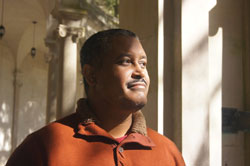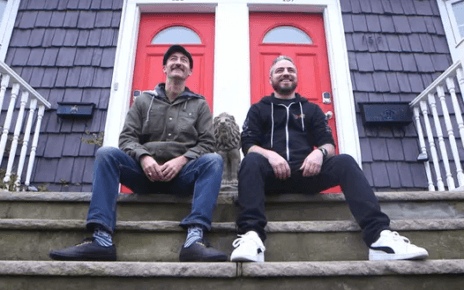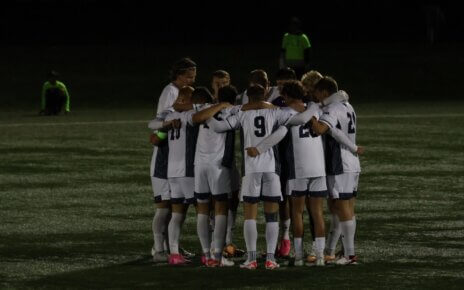Monmouth University’s Sociology Club hosted a fundraising event to raise awareness about the Russia-Ukraine conflict and collect donations toward Razom for Ukraine on Thursday, March 10.
Anastasiya Levytska, a sophomore math and primary education student, first came up with the idea to host the fundraiser. She approached Kayleigh Rucinski, a junior computer science student and President of the Sociology Club, who agreed to help organize an event to raise awareness and collect donations in support of Ukraine.
“I reached out to Kayleigh and told her my story of how I am Ukrainian and I wanted to hold a fundraiser at school to raise money for the Ukrainian Army. I asked if she would help me and she was so supportive with everything,” explained Levytska.
“I am very passionate about the topic myself and wanted to help raise awareness and proceeds to help bring to the Ukrainian people,” added Rucinski.
Levytska and Rucinski ran a table outside of the Rebecca Stafford Student Center, offering candy and cookies for students who made a donation.
Proceeds were donated to Razom for Ukraine. According to their website, Razom is a non-profit organization whose goal is to “unlock the potential of Ukraine” and “build toward a more prosperous, democratic nation” through projects that directly support the Ukrainian cause.
“They have a direct fund that goes into the national bank,” explained Levytska. “Many of my friends and family donated money to that fundraiser as well. Also, my father knows some of the people that run the account.”
Beyond showing financial support for Ukraine, Levytska and Rucinski noted that the Monmouth University community can help by talking about the situation and staying up-to-date on the latest news. “Awareness is impactful within itself,” said Rucinski.
The ever growing popularity of social media presents an ideal opportunity to keep the conversation about Ukraine going. Posting or sharing posts about Ukraine can have a large impact.
“Monmouth University has 18,000 followers on Instagram. Even one post about the situation in Ukraine would reach so many people,” said Levystka, who feels that the University can be doing more to address the war. “Clubs and organizations could hold meetings or plan something, just like the Sociology Club did, either to just inform people about what is going on or hold a fundraiser.”
There has been a general lack of discussion about the Russia-Ukraine conflict within the Monmouth University community. Aside from the Sociology Club, no other club or organization has spoken out about the war or hosted any type of fundraising event.
Levystka also suggested that it could be beneficial for the University to host events that promote diversity by educating students about Ukrainian culture. “I believe learning about other cultures is the best way for people to come together and appreciate how diverse our world is,” she explained.
Along with utilizing its large Instagram following and making an effort to promote Ukrainian culture, Rucinski would like to see the University denounce conversations about the Russia-Ukraine conflict that do not reflect the severity of the situation.
“Many people find it comical to make memes about President Zelenskyy and to joke about a WW3 draft, but in reality, this situation is not a joke. Real people are being affected and real people are losing their lives,” she explained.
Levytska and Rucinski agree that promoting education and awareness within the Monmouth University community can go a long way, which served as the inspiration behind the Sociology Club’s fundraiser.




